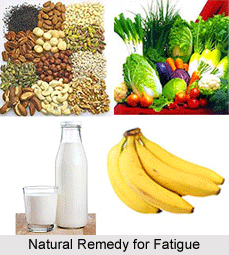 Natural Remedy for Fatigue in Naturopathy prescribes balanced nutritional measures. Proper eating habits are very important in the cure of fatigue. Diet is of utmost importance to deal with fatigue. Nutritional measures are most essential in the natural treatment of fatigue.
Natural Remedy for Fatigue in Naturopathy prescribes balanced nutritional measures. Proper eating habits are very important in the cure of fatigue. Diet is of utmost importance to deal with fatigue. Nutritional measures are most essential in the natural treatment of fatigue.
Fatigue is a term used to describe the general feeling of being tired and weak. It can be related to physical or mental tiredness. Several lifestyle factors, medical conditions or psychological problems can cause fatigue.
Some of the lifestyle factors that contribute to this problem include excessive alcohol use, excessive intake of caffeine, excessive physical activity, inactivity, poor sleep and unhealthy eating habits. One can also feel fatigued due to mental health problems like anxiety, depression, grief and stress. Even certain medical conditions can make one fatigued, such as liver failure, anaemia, cancer, kidney diseases, heart diseases, thyroid disorders, obesity, sleep apnea and diabetes.
Diet Therapy for Fatigue
The patient should eat health foods which provide energy to the body. Studies reveal that people, who eat small mid-meals experience less from fatigue and nervousness, think more clearly and are well-organised than those who eat only 3 meals daily. These mid-meals should consist of fresh or dried fruits, fresh fruit or vegetable juices, raw vegetables or whole grain bread. The mid-meal should be small and less food should be consumed at regular meals.
 The patient should take an optimum diet made up of (i) seeds, nuts and grains, (ii) vegetables, and (iii) fruits. The patient should supplement the 3 health building food groups with special protective foods such as milk, high quality cold-pressed unrefined vegetable oil and honey.
The patient should take an optimum diet made up of (i) seeds, nuts and grains, (ii) vegetables, and (iii) fruits. The patient should supplement the 3 health building food groups with special protective foods such as milk, high quality cold-pressed unrefined vegetable oil and honey.
The patient should avoid depending for an energy lift, on crutches such as taking aspirin, tranquilisers and other drugs, drinking coffee or alcohol, smoking, eating some sugar or sweets.
Juice Therapy for Fatigue
Raw vegetable juices, especially carrot juice, taken separately or in combination with juices of beets and cucumbers are highly valuable in overcoming fatigue.
Nourishments for Fatigue
The vegetarian foods rich in vitamin B are wheat and other whole grain cereals, green leafy vegetables, rice polishing, milk, nuts, banana, yeast, pulses and peas. Minerals are also important. Potassium is particularly needed for protection against fatigue. Raw green vegetables are rich in this mineral. Calcium is indispensable for relaxation and is advantageous in cases of insomnia and tension both of which can lead to fatigue. Sodium and zinc are also beneficial in the treatment of fatigue.
Home Remedies for Fatigue
1. Bananas contain a good amount of potassium, which the body needs to convert sugar into energy. Also, bananas are rich in many important nutrients, such as B vitamins, vitamin C, omega-3 fatty acids, omega-6 fatty acids, fibre and carbohydrates, that help beat tiredness, dehydration and other fatigue symptoms.
2. A cup of refreshing green tea can also fight fatigue, especially stress and work-related fatigue. Green tea contains polyphenols that help reduce stress, boost energy and improve mental focus.
3. Pumpkin seeds make an ideal snack for fighting fatigue. They are loaded with high-quality protein, healthy omega-3 fatty acids and vitamins B1, B2, B5 and B6, as well as minerals like manganese, magnesium, phosphorus, iron and copper. All these nutrients work together to boost immune system, provide energy and fight symptoms of fatigue.
4. A perfect food for fighting fatigue is oatmeal. It contains quality carbohydrates that are stored in the body as glycogen and provide fuel for brain and muscles throughout the day.
5. The high amount of protein, carbohydrates and gut-healthy pro-biotics in yogurt can be a big help to fight symptoms of fatigue. In fact, the body processes yogurt more quickly than any solid food, and hence it works as a great source for quick energy when required. The pro-biotics in yogurt can also help ease symptoms of chronic fatigue syndrome.
6. Watermelon is rich in water and electrolytes that keep dehydration at bay and help keeps active and free from symptoms of fatigue.
Related Articles
Indian Naturopathy
Naturopathy and Diseases
Diet Therapy
Raw Juice Therapy




















